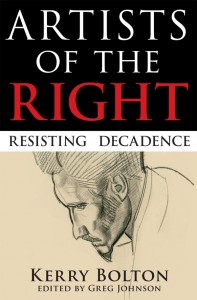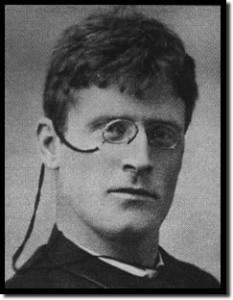Remembering Knut Hamsun
(August 4, 1859–February 19, 1952)
Greg Johnson
Knut Hamsun was born Knut Pedersen in Lom, Norway on August 4, 1859. He died in Grimstad, Norway, on February 19, 1952. The author of more than twenty novels, plus poems, short stories, plays, and essays, Hamsun was one of the twentieth century’s most influential writers. His rejection of both Romanticism and naturalism, his emphasis on outsiders and rebels, and his exploration of inner and sometimes extreme states of consciousness, made him a pioneer of literary modernism. He received the Nobel Prize for literature in 1920.
Indifferent to religion, Hamsun was most deeply influenced by Nietzsche, as well as by Dostoevsky and Strindberg. Hamsun rejected both Communism and capitalism, emphasizing agrarian and ecological values. With the rise of National Socialism in Germany, he at last found a political movement that reflected his own worldview. After the Second World War, Hamsun, his wife Marie, and his son Arild (who had joined the Waffen SS) were imprisoned by the Norwegian government.

You can buy Kerry Bolton’s Artists of the Right here.
We have published one piece by Hamsun, a previously untranslated letter opposing socialism and pacifism that was written during the First World War and later published in a Norwegian National Socialist journal during the Second World War: “Knut Hamsun Against the Socialists.”
Additionally, I wish to draw your attention to the following writings about Hamsun on this website:
- Alain de Benoist, “Knut Hamsun” (Czech version here)
- Kerry Bolton, “Knut Hamsun” (reprinted in Artists of the Right)
- Mark Deavin, “Knut Hamsun and the Cause of Europe.”
- Spencer J. Quinn, “Knut Hamsun’s Growth of the Soil.”
- Spencer J. Quinn, “Knut Hamsun’s Hunger.”
- Spencer J. Quinn, “Knut Hamsun’s The Women at the Pump.”
- Quintilian, “Knut Hamsun’s Pan.”
- Robert Steuckers, “Paganism and Vitalism in Knut Hamsun and D. H. Lawrence,” Part 1, Part 2
- Anonymous, “Knut Hamsun: Saved by Stalin?”
 Hamsun’s Growth of the Soil (1917) is his longest but most accessible novel; it won him the Nobel Prize. Hamsun’s breakthrough novel is Hunger (1890), which is one of the most unsettling books I have ever read — up there with Mishima’s best work. Other highly recommended shorter, early novels are Mysteries (1892) and Pan: From Lieutenant Thomas Glahn’s Papers (1894).
Hamsun’s Growth of the Soil (1917) is his longest but most accessible novel; it won him the Nobel Prize. Hamsun’s breakthrough novel is Hunger (1890), which is one of the most unsettling books I have ever read — up there with Mishima’s best work. Other highly recommended shorter, early novels are Mysteries (1892) and Pan: From Lieutenant Thomas Glahn’s Papers (1894).
As a young man, Hamsun spent four years in the United States, which gave him an abiding distaste for Anglo-Saxon culture and capitalism — convictions that were hardened during the Second Boer War. See Knut Hamsun Remembers America: Essays and Stories, 1885–1949, ed. and trans. Richard Nelson Current (Columbia: University of Missouri Press, 2003).
For a biography of Hamsun, I highly recommend Robert Ferguson, Enigma: The Life of Knut Hamsun (New York: Farrar Straus Giroux, 1987). I have not read Ingar Slettin Koloen’s Knut Hamsun: Dreamer & Dissenter (New Haven: Yale University Press, 2009), but it is supposed to be definitive. Finally, I highly recommend Swedish director Jan Troell’s 1996 biopic Hamsun, starring Max von Sydow as Hamsun.
* * *
Like all journals of dissident ideas, Counter-Currents depends on the support of readers like you. Help us compete with the censors of the Left and the violent accelerationists of the Right with a donation today. (The easiest way to help is with an e-check donation. All you need is your checkbook.)
Due to an ongoing cyber attack from those who disagree with our political discourse, our Green Money echeck services are temporarily down. We are working to get it restored as soon as possible. In the meantime, we welcome your orders and gifts via:
- Entropy: click here and select “send paid chat” (please add 15% to cover credit card processing fees)
- Check, Cash, or Money Order to Counter-Currents Publishing, PO Box 22638, San Francisco, CA 94122
- Contact [email protected] for bank transfer information
Thank you for your support!
For other ways to donate, click here.
Remembering%20Knut%20Hamsun%20%28August%204%2C%201859and%238211%3BFebruary%2019%2C%201952%29
Enjoyed this article?
Be the first to leave a tip in the jar!
Related
-
Counter-Currents Radio Podcast No. 584: The Counter-Currents Book Club — Jim Goad’s Whiteness: The Original Sin
-
Nowej Prawicy przeciw Starej Prawicy, Rozdział 6: Znaczenie filozofii dla zmiany politycznej
-
Nowej Prawicy przeciw Starej Prawicy, Rozdział 5: Refleksje nad Pojęciem polityczności Carla Schmitta
-
Remembering Bill Hopkins
-
Nowej Prawicy przeciw Starej Prawicy, Rozdział 4: Teoria i praktyka
-
Nowej Prawicy przeciw Starej Prawicy, Rozdział 3: Metapolityka i wojna tajemna
-
Counter-Currents Radio Podcast No. 583: Judd Blevins on His Recall and Pro-White Politics
-
Remembering Sam Francis (April 29, 1947–February 15, 2005)

8 comments
July 6, 2010
Knut Hamsun: Saved by Stalin?
Interesting story. Possibly it is true. Stalin could sometimes save somebody, preferable some prominent foreigners, especially when it would be good for propaganda.
But I think the Norwegian authorities would not hang Gamsun anyway, even without this hypothetical Soviet intervention. It would be not good to hang such old man, and so well-known. The French have not executed their old Petain, and he as politician was much more “gulity”, than Gamsun, simply a writer, i.e. private person. And it is not good (in the eyes of the world) to execute famous poets and writers. It is much convenient to jail them (as it was in Türkey with Atsiz after 3. May) or to send to mental hospital (as it was with Ezra Pound). A poet safely in mental hospital … and nobody cares, well, “he´s simply crazy, and that´s normal among poets”.
In France, the “victors” did not hesitate to have the writer Robert Brasillach executed.
As for Pétain, it was difficult to condemn to death a man rightly considered as the “Winner of Verdun”.
Yes, and for Norwegians it was not too easy to execute not just any writer, but Nobel prize winner, well-known everywhere in the world, maybe the most famous Norwegian of his times. It would be simply too much. Brasillach was possibly a good writer, I do not know that, but anyway not on Gamsun´s level and not so known in the world.
This guy looks like Greg Johnson, lol.
There is a scene in Hamsun the biopic where they show him footage of the Holocaust™ and he begins tearing up and says something like “oh no… I never knew…”—does anyone know of the veracity of this event? It seems like a piece of fanfiction on the part of the director, but I haven’t read into his biographies or books relating to the trial.
I would think that a fiction writer of Hamsun’s stature would be skeptical of a picture with a caption. There’s a box of wedding rings floating around out there that is variously captioned: rings stolen from Jews before they were gassed at Auschwitz and rings recovered from charred corpses at Dresden.
My favorite example is my own creation: Have you seen those chilling photographs of Hitler feeding cyanide capsules to innocent little deer?
At the end of 1945, the Soviet Minister for foreign affairs, Molotov, informed his Norwegian colleague Trygve Lie that it “would be regrettable to see Norway condemning his great writer to the gallows.”
Trygve Lie should just politely ask Comrade Molotov how many poets and writers have been killed, jailed, driven to exile and to suicide, by Bolsheviks during 30 years since 1917. Not only Russian writers, but of all nations of the former Russian Empire; Georgians, Qazaqs, Özbeks, Ukrainians, Lithuainians, Belorussians, Tatars, Soviet Poles, Germans, Jews and Greeks, Caucasian and Edil-Ural peoples, and of all others. That´s so nice to hear good words from such humanists as Stalin and Molotov.
If you have Paywall access,
simply login first to see your comment auto-approved.
Note on comments privacy & moderation
Your email is never published nor shared.
Comments are moderated. If you don't see your comment, please be patient. If approved, it will appear here soon. Do not post your comment a second time.